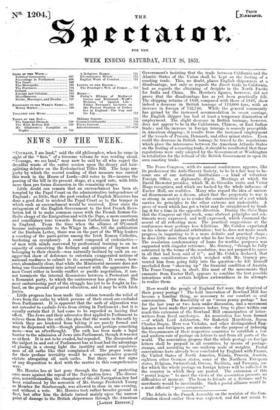NEWS OF THE WEEK.
"COURAGE, I see land," said the old philosopher, when he came in sight of the "finis" of a tiresome volume he was reading aloud. " Courage, we see land," may now be said by all who regret the dreadful waste of the entire session upon the dreary and hair- splitting debates on the Ecclesiastical Titles 13111. The large ma- jority by which the second reading of that measure was carried this week in the House of Lords-265 votes to 38—insures the passing of the bill in its present shape, at a rapid rate, with little more than pro forma discussion in the remaining stages.
Little doubt can remain that an encroachment has been at- tempted by the Papal Court on the administrative independence of England ; as little, that the past conduct of English Mihisters has done a good deal to mislead the Papal Court as to the temper in -which such an encroachment would be received. Ever since the • antagonism of -the English Government to the first French Revo- lution led it to make common cause with the French Radian Ca- tholic clergy of the Emigration and with the Pope, a more courteous .and conciliatory tone towards Roman Catholicism has prevailed in England. From the time when the alliance of O'Connell became indispensable to the Whigs in office, till the publication of the Durham Letter, there was on the part of the Whig leaders a courting of the parti-pretre among the Irish Roman Catholics, bordering on sycophancy. A court composed of ecclesiastics— of men with minds narrowed by professional training to an in- capacity of conceiving the feelings and opinions of laymen not belonging to their church—was naturally inclined by such an ex- aggerated show of deference to entertain exaggerated notions of _national readiness to submit to its assumptions. It seems, how- ever,-abundantly clear, that while the Ministerial measure does not bring our Government into actual contact with the aggressive Ro- man Court either in hostile conflict or pacific negotiation, it can- not terminate the internal dissensions between a Protestant and a Romanist party, to which the controversy has given rise. The most embarrassing part of the struggle has yet to be fought in Ire- land, on the ground of general education, and it may be with Irish juries. Little progress has been made this segsion towards the relief of Jews from the oaths by which persons of their creed are excluded from Parliament. It is apparent that the oath of abjuration was not intended to exclude jews from sitting in Parliament ; but it is equally certain that it had come to be regarded as having that effect. The Jews and their advocates first applied to Parliament to relieve them from the oath ; the plea that the words in the oath by -which they are hindered from taking it are purely formal and may be dispensed with—though plausible' and perhaps something 'more—was an afterthought. The oath has been made a legal barrier to the admission of Jews into Parliament, though it was not so atfirst. It is not to be evaded, but repealed. The discussion of thelsubject in and out of Parliament has at least had the advantage of placmg in a strong light the inutility and moral repulsive- ness of all oaths like that complained of. The proper remedy for their profane triviality would be a comprehensive general statute abrogating all such oaths. But there are few signs of any disposition to deal with the matter in this comprehensive way. ' Mr. Herries has at last gone through the forms of protesting )ace more against the repeal of the Navigation-laws. The discus- sion, notwithstanding the champions of the old Navigation-law had been reinforced by the accession of Mr. George Frederick Young as Member for Scarborough, was allowed to close in one evening, and without a vote. Mr. Herries took rather broader ground at first, but after him the 'debate turned mainly upon the narrow point .of damage to the British shipowners through the American Government's insisting that the trade between California and the Alantic States of the Union shall be kept on the footing of a coasting trade. This, no doubt, places English shipowners at a disadvantage, not only as regards the direct trade to California, but as regards the obtaining of freights in the North Pacific for India and China. Mr. Herries's figures, however, did not prove that the disadvantage has as yet been practically felt. The shipping returns of 1850, compared with those of 1849, show indeed a decrease in British tonnage of 113,000 tons, with an increase in foreign of 732,746. While the general community has gained by the increased accommodation in ocean carriage, the English shipper has had at least a temporary diminution of employment. The slight decrease in British tonnage, however, does not appear to be in the Californian, Chinese, or East Indian trade ; and the increase in foreign tonnage is scarcely perceptible in American shipping ; it results from the increased employment of the vessels of Prussia, Denmark, and other minor states. Even could the decrease in British tonnage be traced to the regulations which place the intercourse between the American Atlantic States on the footing of a coasting trade, it should be recollected that these regulations were only adopted by the Government at Washington in retaliation for the refusal of the British Government to open its own coasting trade.


























